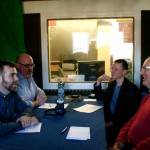 As Clive Barnett (here, and in more detail here) and Stuart Elden (here) have already posted, the Society and Space open site has now released a podcast conversation between myself, Clive Barnett and Allan Cochrane, hosted by Tim Markham, about our paper recently published in the journal. In conjunction with the podcast being published, the paper itself has been made open access until 13 February 2015.
As Clive Barnett (here, and in more detail here) and Stuart Elden (here) have already posted, the Society and Space open site has now released a podcast conversation between myself, Clive Barnett and Allan Cochrane, hosted by Tim Markham, about our paper recently published in the journal. In conjunction with the podcast being published, the paper itself has been made open access until 13 February 2015.
The ‘slow theory’ label is quite apt for this paper in particular (though I seem to end up describing almost every paper I publish in terms of long fruitions or at least lengthy processes). It’s a paper which has had a long evolution, an evolution which included a fairly long stretch of time prior to submitting it for peer review (though it evolved after that, too, of course). Certainly, for a good couple of years, the paper became a sort of backgrounded theoretical touchstone for me, for instance while I worked on sole-authored empirical papers. Indeed, I’ve even kept a few choice draft versions along the way. For example, one iteration of the paper grew into something of a review of the bodies of literature we ended up calling the ‘media-urban nexus’. Though we eventually and perhaps thankfully moved away from that sort of paper, I’ve often found that version’s (overly) exhaustive reference list rather useful.
Anyway, this podcast is an attempt to both summarise what the paper is about, but also to reflect a little on that evolution process, and hopefully it adds something for readers. The actual production of the podcast was also a learning experience for me, part of the slow theory, perhaps. Doing the recording was notably DIY. Though for various reasons I do know a few things about sound editing, this was the first time I’ve edited an interview specifically. Probably a good thing, a skill I could make use of again for sure. At the same time, of course, it’s an example of how much we academics increasingly need to be multidisciplinary/multimedia researchers (I’ve written about the ambiguous merits of this before). I think mainly what I’m trying to say is, if you don’t like the sound editing, or indeed the photo, you know who to blame.
0 Comments Leave a comment